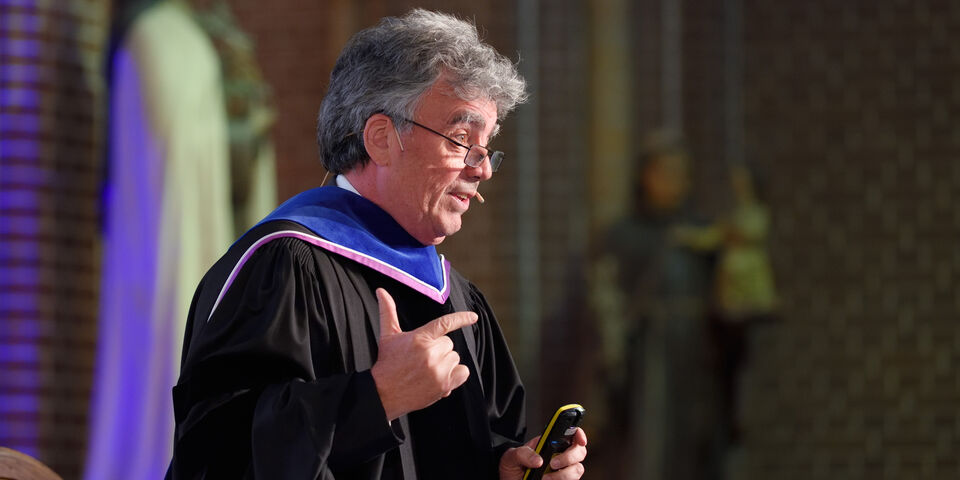Foundation Day "Strong financial basis essential to survival"
Enabling dreams to become reality. That, says the President of the Executive Board Jan Mengelers, is what TU/e has been doing for the past sixty-one years. Patrick Aebischer, President of the Swiss EPFL until the end of 2016, said yesterday during the celebration of TU/e's Foundation Day in the Paterskerk, that in future this will require universities to have an even stronger financial basis. "Universities that fail to make that happen will go bankrupt or lose their research arm," he warned those in attendance.
After giving a brief history of TU/e and the environment in which the university has developed over the past sixty-one years, President Jan Mengelers quickly returned to the present in his speech. "The quality of our education and the reduction of the work pressure on our employees are our top priorities. If yet again student intake increases by more than 30 percent in the next academic year, we will have to take appropriate measures."
While not stating it explicitly, all those present knew this means that in September 2018 a student stop will be placed on four study programs. Mengelers called this a crying shame, "especially now that it is evident from the employment market that twice as many well-qualified engineers are needed than we can deliver at present."
As to how the work pressure would be reduced in the coming years, he gave no specifics. "We must try to protect our employees from all the rules and pressure imposed externally. In addition, work efficiency must be increased by simplifying internal processes."
Survival
Patrick Aebischer was one of the speakers yesterday at the celebration of the Dies Natalis. For the past five years, his university, the École Polytechnique Fédérale de Lausanne, has been a member of the EuroTech Universities Alliance, together with TU/e and the technology universities of Munich and Copenhagen. The message of the former top executive of EPFL was clear: universities that want to survive in the future must ensure that they increase their revenues considerably.
Relying on more resources from government or that tuition fees will be raised is not the solution, believes the man who stood at the helm of EPFL for the past seventeen years. By contrast, solace is to be found in cooperation with trade and industry, which would involve passing on all overhead costs to them, as well as the warm-hearted adoption of online education.
In addition, seeking sponsors and donors has been one of Aebischer's most important tasks. Accordingly, he urged Mengelers to start spending at least 50 percent of his time on this. "It is work that must be done and fortunately it translates into funds," he said with a smile. During his presidency, Aebischer was able to secure a billion euros in gifts and donations for EPFL and construction cranes were an almost permanent fixture on the campus.
Labs
Money that is also necessary to furnish labs with equipment that is increasingly expensive. The labs, says Aebischer, are necessary to stay in the vanguard of scientific achievers, but can also be rented out to other parties. EPFL's own labs now number 390, but the organization is keen to expand its labs to 500 in total.
Online education in the form of Massive Open Online Courses or MOOCs are also, in Aebischer's vision, indispensible to the university of the future. The number of students present at EPFL is roughly equal to those on the campus in Eindhoven - over 10,000. But in the MOOCs run by EPFL1.7 million people are now enrolled, a considerable proportion of whom complete their course with a degree qualification.
"These days we are recruiting almost as many students online in a week as are present on our campus. And the interest is worldwide." According to Aebischer, universities that do not keep up with this changing world will soon be bankrupt, or will find it necessary to lose their research arm. He said that for Europe it is still not too late to set to work achieving this. "We still have significant ground to make up if we compare ourselves to the US, but Trump's decision to make it more difficult for foreign scientists to work in the US is certainly not an unfavorable development."
Bart van Overbeeke was the dedicated photographer during the Foundation Day. You can go through his photos on Flickr.


Discussion